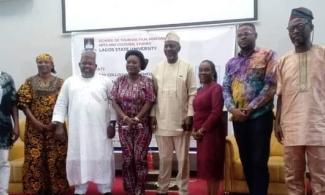
This was made known by Dr Olubunmi Adedina of the Department of Theatre and Music, LASU; Dr. Saheed Timehin and Dr. Adeyinka Wulemat Olarinmoye, Acting Head of Department, Tourism and Hospitality, School of Tourism, Film, Performing Arts and Cultural Studies, who are all speakers at the first of its kind colloquium, hosted by the newly established School of Tourism, Film, Performing Arts, and Cultural Studies, Lagos State University (LASU),
Some Lagos State University (LASU) stakeholders have called for the overall review of "Widow Inheritance" in Nigeria, West Africa and by extension Africa.
This was made known by Dr Olubunmi Adedina of the Department of Theatre and Music, LASU; Dr. Saheed Timehin and Dr. Adeyinka Wulemat Olarinmoye, Acting Head of Department, Tourism and Hospitality, School of Tourism, Film, Performing Arts and Cultural Studies, who are all speakers at the first of its kind colloquium, hosted by the newly established School of Tourism, Film, Performing Arts, and Cultural Studies, Lagos State University (LASU),
The speakers at the colloquium with the theme "Widow Inheritance: Myth and Reality" held on Wednesday at the Aderemi Makanjuola Lecture Theatre, main campus, Ojo, Lagos, said the practice was long steeped in culture, but still well practised today, for the good of widows, as well as to protect them against societal reproach.
The first speaker, Dr Adedina, Department of Theatre and Music, LASUED, who is on Sabbatical at LASU, noted that widowhood inheritance in Igboland was not by force, but voluntary, adding that culture is dynamic, evolving, and should be reviewed.
She expressed her displeasure at the fact that African communities were becoming individualistic and no longer communal.
"This generation will see widow inheritance as barbaric. With the present economic realities, no man wants to add to his burden by taking in a widow. In Igbo culture, it is not by force that the brother of the deceased marries the wife of his late brother.
"Widow inheritance is a transitional culture, which would go out of fashion with time," she stated.
Dr. Saheed Timehin, who represented Prof. Amidu Sanni in his part explained that a woman in Islam has the right to inheritance.
"An inheritor can not be inherited. She is not a property. Muslim societies have not lived up to the dictates of Islam as regards the issue of widow inheritance. Islam is very clear about women, and they have a place of honour. A woman can inherit her father as well as her husband's property. That is the position of Islam.
"It is sinful for a family to force a widow to stay in the family for the sake of inheritance."
He added that her inheritance should not be tied to her being inherited.
"Widow Inheritance is waning in cosmopolitan cities. Forced widow inheritance should be discouraged. It is a very unfair practice to the women. Widow inheritance should not be forced and not compulsory, and the solution to it is polygyny. An inheritor can not be part of the inheritance," he said.
However, Dr. Adeyinka Wulemat Olarinmoye, Acting Head of Department, Tourism and Hospitality, School of Tourism, Film, Performing Arts and Cultural Studies (LASU), speaking on the same topic, expressed her view, from a Yoruba cultural perspective, enthusing that the practice is meant to protect the vulnerable widows in the society and they are not forced into it.
She informed that the practice is well established in Nigeria, Africa, and some parts of Asia. She disclosed that the Yorubas established it as an act of succour to help the widows overcome the challenges of widowhood after the demise of their husbands.
She added that the widow inheritance is still much in practice in the southwest of Nigeria, and the women do it without any coercion.
She advised those in authority, especially culture gatekeepers, to fine tune the practice in conformity with modern realities.
Earlier, before the speakers got on the stage, the Dean, School of Tourism, Film, Performing Arts and Cultural Studies, LASU, Prof. Tunji Azeez, in his address, explained the reason why the topic was chosen.
He said it was because of the reality about widowhood and the need to look at it from different angles of life. He stated the speakers were carefully chosen with their knowledge about the issue of discourse.
Speaking on the school, he asserted it has six(6) departments, Theatre Arts, Music, Film production, Archaeology and Cultural Resource Management, Border and Migration Studies, Tourism and Hospitality Studies and the University Management and Governing Council are working round the clock in ensuring the programmes are advertised in the next JAMB admission.
According to the Dean, Lagos State, through the school, has cemented its place as the hub of culture and creativity as the leading state in culture and entertainment space.